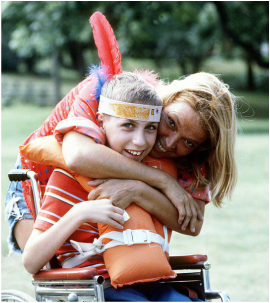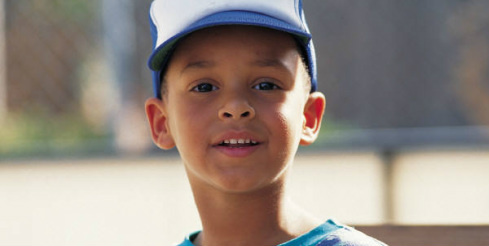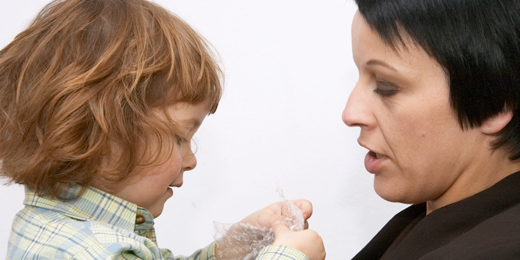Disabilities cover a wide range. Some are obvious—such as a child with a physical disability who uses a wheelchair, or a child with a visual impairment who uses a cane to navigate when walking. Other disabilities may be more “hidden”—for example, children who have learning disabilities or autism spectrum disorder. Chances are that at some point your child will have a classmate with a disability. Just as you guided your very young child when he or she began to befriend others, you can encourage your child to learn about and be a friend to children who have special needs. Basic ideas to share with your child
Try to use clear, respectful language when talking about someone with special needs. For a younger child, keep explanations simple, such as, “She uses a wheelchair because a part of her body does not work so well.” Reinforce with your child that namecalling— even if meant as a joke—is always unacceptable as it hurts people’s feelings. Getting to know children with special needs Paradoxically, when it comes to approaching someone with a disability, children may be better at it than their parents because they are less inhibited. Some adults—especially those without previous exposure to people with special needs—may be more timid. Worried about appearing intrusive or insensitive, they may not know what to say or do. “The other kids are great,” [Jasmine’s] mom says, “They are very direct, which is good. They like her and want to interact with her.” However, if your child (or you, for that matter) is unsure about approaching a child with a disability, here are some helpful tips:
Learning more about special needs Reading or learning about a disability is a great way to further understand a child’s experiences. It may also help dispel any questions you or your child may have. Your local library and librarian can be a great resource for finding age-appropriate books and materials. Deborah Elbaum, M.D. is a parent of three children and lives in Massachusetts. She is a volunteer for the disability awareness program taught at her children’s school. Article courtesy of Motivated magazine. Used with permission. Photo in public domain.
0 Comments
William J. Bennett; book excerpt
All parents have solemn responsibilities for the education of their young, but nowhere are such duties weightier or more difficult than when a child has a disability. If yours does, or if you have observed a worrisome delay in his development, you are surely upset and at least a little bit confused. Some parents in this situation also find themselves feeling angry, guilty, and beleaguered. Here is how Patricia McGill Smith, director of the National Parent Council on Disabilities, describes these reactions: When parents learn about any difficulty or problem in their child’s development, this information comes as a tremendous blow. The day my child was diagnosed as having a disability, I was devastated—and so confused that I recall little else about those first days other than the heartbreak…. Another parent describes the trauma as “having a knife stuck” in her heart. Do not despair. You are in a difficult situation, one you did not seek or expect to be in, but much can be done. There are many sources of information and help. Millions of other parents who have trod this rocky road ahead of you are glad to offer guidance, encouragement, and assistance. The next few pages will introduce you to this complex topic. Educating children with disabilities spans a host of issues, however, and we are able only to touch on a few key points. … We begin with three general guidelines:
What Is “Special Education”? The term “special education” means individualized instruction designed to meet the unique needs of students with physical, mental, emotional, behavioral, or learning-related disabilities. In other words, it is education for youngsters who have some sort of problem that hinders their ability to learn successfully in a regular classroom using conventional teaching approaches. There was a time in this country when children with disabilities did not get a good shot at a proper education. That began to change in 1975 (earlier in some states) with passage of federal legislation now known as the Individuals with Disabilities Education Act, or IDEA. This law requires school districts to provide “free appropriate public education” to children with disabilities and learning problems. According to the U.S. Department of Education, about five and a half million children—approximately twelve out of every 100 students—are presently classified as disabled. For example, youngsters who have difficulty seeing, hearing, or walking might be categorized as having an educational disability. So might children with mental retardation, chronic illness, emotional disturbance, brain or spinal cord injury, genetic conditions such as Down syndrome, or serious social maladjustment. The key is that the child’s condition must interfere with his ability to learn. “Disabilities” come in many different categories, often in combinations. Every youngster is a unique collection of capabilities and limitations. The idea of modern special education is to tailor an education program to the specific needs of a particular child, maximizing his strengths, compensating for (and where possible circumnavigating) his weaknesses. To the greatest degree appropriate to the child, he must be given access to the standard curriculum, helped to attain the academic standards of his school or state, and included in the life and activities of his school. This can take some doing. If a child has a disability that affects his learning, placing him in a conventional classroom staffed only by a regular teacher may not work well. More is often needed. That may mean speech or occupational therapy, special tutoring, or medical assistance. It may involve physical accommodation (e.g., wheelchair access), special learning tools (e.g., Braille books and computers), or extra help (e.g., a nurse or classroom aide). All this and more is possible in U.S. schools. Indeed, if your disabled child needs it for his education to succeed, he has a legal right to it, and you have the right to be involved in making these decisions. Special ed is complicated and fraught with challenges. It is often controversial. (Those extra services, people, and equipment make a dent in the school system’s budget, and the federal and state dollars supplied for these purposes are rarely sufficient to cover the full costs.) From the parent’s standpoint, however, your job is to get the best education you can for your child. And that begins with an accurate evaluation of his situation. By a father of three exceptional children I have been a special needs parent for over a decade and something that I learned along the way is that despite my very best efforts, at the end of the day, I’m only human. I get frustrated, overwhelmed, and on occasion say and do the wrong thing. One of the things that happens quite often to special needs parents is that the demand on us simply exceeds the resources we have available, be it emotional, physical, or financial. This demand is constant in many cases, and the strain over time becomes more and more difficult to carry. The stress can really take its toll. I feel that as special needs parents, we often don’t give ourselves enough credit or cut ourselves enough slack. Speaking for myself only, I have a tendency to be overly critical of myself, especially when I feel I’m failing at something, which is honestly, quite often. However, in reality, I’m failing to remember that I’m doing or trying to do things every day that most people simply couldn’t handle. We tend to become so accustomed to everything that we often focus more on our perceived losses or defeats than we do on our successes and victories. One of the things that I have always encouraged people to do is share their feelings. Venting, or expressing what we are going through, is something that is extremely important in special needs parenting. Again, speaking only for myself, I’m under constant and unforgiving pressure. These pressures can range from health or behavioral issues to simply trying to make ends meet. Some of this pressure I put on myself, but most of it is inherent to special needs parenting in general. There are times that my kids drive me crazy and I swear that my head is going to explode. For a long time this was like a double-edged sword. I would be so incredibly stressed out, overwhelmed, and frustrated. On top of that, I would feel an extreme sense of guilt for being stressed out, overwhelmed, and frustrated. The kids had no control over most of their behaviors, but I had this idea that, as their father, I was supposed to have this never-ending supply of patience. Instead I was always “a day late and a dollar short.” There were times that I was so far gone that I would go through a drive-thru to pick up dinner and when asked, “Can I take your order?”, I would answer, “I’ll take some sanity with a side order of patience and some peace and quiet for desert…oh…and…supersize that.” Apparently, this kind of stuff is not on the menu…anywhere! Trust me, I’ve tried everywhere. You can ask my wife. She was always mortified when I would place my order. Then one day, it hit me. I’m not sure how or why this happened, but I realized that I didn’t have to feel guilty for being frustrated, overwhelmed, and stressed out by my kids or their behavior. I guess I had felt like if I admitted that I was frustrated or overwhelmed by the challenges associated with raising three boys with special needs, that it somehow reflected poorly on them, or that I loved them less. I didn’t want anyone to think that about my kids because, while challenging, they are totally awesome, and I wouldn’t trade them for anything in the world. Admitting frustration with those challenges, or even with any or all of my kids, doesn’t mean they are bad and it certainly doesn’t mean that I somehow love them any less. What admitting this did mean however, was that I was human. I learned that not only was it normal to feel these things, but it was also healthy. This was such a powerful realization for me, and it changed my perspective considerably. I discovered that acknowledging these feelings, and even embracing them, provided a much-needed sense of relief. The relief really kicked in when I became comfortable enough with these feelings to not only admit them to myself, but share them publicly as well. While that may not appeal to everyone, and understandably so, it helped me to keep myself centered. I think that this is something particularly difficult for fathers. Society tells us that we are supposed to be almost emotionless and not feel these things and if as a man, you actually do have these feelings, God forbid you ever admit it. Look, we are human beings living in very difficult situations. These situations very often require sacrifice to the nth degree. Feeling frustrated, overwhelmed, or even resentful is completely normal, at least in my opinion. I also think that admitting these things is not a sign of weakness or even bad parenting. In fact, I would argue that it shows great courage and a deep unconditional love for our kids. Honestly, no one likes admitting things like this, but in doing so we get a better understanding of our limitations and ourselves. As far as I’m concerned, this helps to make me a better parent, and speaking for myself, I need all the help I can get. Article courtesy of Motivated magazine. Used with permission. Photo by David Castillo Dominici/FreeDigitalPhotos.net.
Author Unknown Each exceptional child is different, of course, but here’s something that one such child might want to tell you—if they could. Spend time getting to know me. Please have patience with me. I may not be able to do the things another child can. Enjoy learning about my special needs so that you will understand. Care about what my parents or caregivers tell you about how I communicate. Imagine your child having problems, then realize what my parents feel. Always be kind to people who are disabled. We are just like you. Listen to me. I may be hard to understand, but if you take the time, you can understand me. Never blame my parents. They didn’t do anything wrong or cause me to be the way I am. Encourage my parents and caregivers. They need it. Entertain me, so that my parents or caregivers can have some time off. Distraction is part of my daily life. I can’t sit still. I try, but I can’t. Screaming is what I sometimes do when I can’t handle what is going on around me. I want to tell you what is wrong, but I can’t. Courtesy of Motivated magazine. Used with permission.
By Horace Edwards
In Brooklyn, New York, Shush is a school that caters to learning-disabled children. Some children remain in Shush for their entire school career, while others can be mainstreamed into conventional schools. At a Shush fundraising dinner, the father of a Shush child delivered a speech that would never be forgotten by all who attended. After extolling the school and its dedicated staff, he cried out, “Where is the perfection in my son Shaya? Everything God does is done with perfection. But my child cannot understand things as other children do. My child cannot remember facts and figures as other children do. Where is God’s perfection?” The audience was shocked by the question, pained by the father’s anguish, and stilled by the piercing query. “I believe,” the father answered, “that when God brings a child like this into the world, the perfection that He seeks is in the way people react to this child.” He then told the following story about his son: One afternoon Shaya and his father walked past a park where some boys Shaya knew were playing baseball. Shaya asked, “Do you think they will let me play?” Shaya’s father knew that his son was not at all athletic and that most boys would not want him on their team. But Shaya’s father understood that if his son was chosen to play, it would give him a comfortable sense of belonging. Shaya’s father approached one of the boys in the field and asked if Shaya could play. The boy looked around for guidance from his teammates. Getting none, he took matters into his own hands and said, “We are losing by six runs and the game is in the eighth inning. I guess he can be on our team and we’ll try to put him up to bat in the ninth inning.” Shaya’s father was ecstatic as Shaya smiled broadly. Shaya was told to put on a glove and go out to play short center field. In the bottom of the eighth inning, Shaya’s team scored a few runs but was still behind by three. In the bottom of the ninth inning, Shaya’s team scored again, and now with two outs and the bases loaded with the potential winning run on base, Shaya was scheduled to be up. Would the team actually let Shaya bat at this juncture and give away their chance to win the game? Surprisingly, Shaya was given the bat. Everyone knew that it was all but impossible because Shaya didn’t even know how to hold the bat properly, let alone hit with it. However, as Shaya stepped up to the plate, the pitcher moved a few steps closer to home plate and lobbed the ball in softly so Shaya would at least be able to make contact. The first pitch came in, and Shaya swung clumsily and missed. One of Shaya’s teammates came up to Shaya and together they held the bat and faced the pitcher, waiting for the next pitch. The pitcher took a few more steps forward and tossed the ball softly toward Shaya. As the pitch came in, Shaya and his teammate swung at the bat and together they hit a slow ground ball to the pitcher. The pitcher picked up the soft grounder and could easily have thrown the ball to the first baseman. Shaya would have been out and that would have ended the game. Instead, the pitcher took the ball and threw it on a high arc to right field, far beyond reach of the first baseman. Everyone started yelling, “Shaya, run to first! Run to first!” Never in his life had Shaya run to first. He scampered down the baseline wide-eyed and startled. By the time he reached first base, the right fielder had the ball. Shaya kept running. The right fielder could have thrown the ball to the second baseman, who would have tagged Shaya out, but the right fielder understood the pitcher’s intentions and threw the ball high and far over the third baseman’s head. Everyone yelled, “Run to second, run to second!” Shaya ran towards second base as the runners ahead of him deliriously circled the bases towards home. As Shaya reached second base, the opposing shortstop ran to him, turned him in the direction of third base and shouted, “Run to third!” As Shaya rounded third, the boys from both teams ran behind him screaming, “Shaya, run home!” Shaya ran home, stepped on home plate, and all 18 boys lifted him on their shoulders. Shaya was the hero. He had just hit a grand slam home run and won the game for his team. “That day,” said the father softly with tears now rolling down his face, “those 18 boys reached their level of God’s perfection.” Abbie Blair was a social worker back in the 1960s. On one occasion, she set up an adoption that she will never, ever forget. Let Abbie tell the story.
I remember the first time I saw Freddie. His foster mother had brought him to the adoption agency where I work, so I could meet him and help find adoptive parents for him. He was standing in a playpen and gave me a toothy grin. What a beautiful baby, I thought. His foster mother gathered him into her arms. “Will you be able to find a family for Freddie?” Then I saw it. Freddie had been born without arms. “He’s so smart. He’s only ten months old, and already he walks and talks.” She kissed him. “Say ‘book’ for Mrs. Blair.” Freddie grinned at me and hid his head on his foster mother’s shoulder. “Now, Freddie, don’t act that way,” she said. “He’s really very friendly,” she added. “Such a good, good boy.” Freddie reminded me of my own son when he was that age, the same thick dark curls, the same brown eyes. “You won’t forget him, Mrs. Blair? You will try?” “I won’t forget.” I went upstairs and got out my latest copy of the Hard-to-Place list. Freddie is a ten-month-old white Protestant boy of English and French background. He has brown eyes, dark-brown hair and fair skin. Freddie was born without arms, but is otherwise in good health. His foster mother feels he is showing signs of superior mentality, and he is already walking and saying a few words. Freddie is a warm, affectionate child who has been surrendered by his natural mother and is ready for adoption. He’s ready, I thought. But who is ready for him? It was ten o’clock on a lovely late-summer morning, and the agency was full of couples—couples having interviews, couples meeting babies, families being born. These couples nearly always have the same dream: They want a child as much like themselves as possible, as young as possible, and—most important—a child with no medical problems. “If he develops a problem after we get him,” they say, “that is a risk we’ll take, just like any other parents. But to pick a baby who already has a problem—that’s too much.” And who can blame them? I wasn’t alone in looking for parents for Freddie. Any of the caseworkers meeting a new couple started with a hope: Maybe they were for Freddie. But summer slipped into fall, and Freddie was with us for his first birthday. “Freddie is so-o-o big,” said Freddie, laughing. “So-o-o big.” And then I found them. It started out as it always does—an impersonal record in my box, a new case, a new “Home Study,” two people who wanted a child. They were Frances and Edwin Pearson. She was 41. He was 45. She was a housewife. He was a truck driver. I went to see them. They lived in a tiny white frame house in a big yard full of sun and old trees. They greeted me together at the door, eager and scared to death. Mrs. Pearson produced steaming coffee and oven-warm cookies. They sat before me on the sofa, close together, holding hands. After a moment, Mrs. Pearson began: “Today is our wedding anniversary. Eighteen years.” “Good years.” Mr. Pearson looked at his wife. “Except … “ “Yes,” she said. “Except. Always the ‘except.’” She looked around the immaculate room. “It’s too neat,” she said. “You know?” I thought of my own living room with my three children. Teenagers now. “Yes,” I said. “I know.” “Perhaps we’re too old?” I smiled. “I don’t think so,” I said. “We don’t either.” “You always think it will be this month, and then next month,” Mr. Pearson said. “Examinations. Tests. All kinds of things. Over and over. But nothing ever happened. You just go on hoping and hoping, and time keeps slipping by.” “We’ve tried to adopt before this,” Mr. Pearson said. “One agency told us our apartment was too small, so we got this house. Then another agency said I didn’t make enough money. We had decided that was it, but this friend told us about you, and we decided to make one last try.” “I’m glad,” I said. Mrs. Pearson glanced at her husband proudly. “Can we choose at all?” she asked. “A boy for my husband?” “We’ll try for a boy,” I said. “What kind of boy?” Mrs. Pearson laughed. “How many kinds are there? Just a boy. My husband is very athletic. He played football in high school—basketball, too, and track. He would be good for a boy.” Mr. Pearson looked at me. “I know you can’t tell exactly,” he said, “but can you give us any idea how soon? We’ve waited so long.” I hesitated. There is always this question. “Next summer maybe,” said Mrs. Pearson. “We could take him to the beach.” “That long?” Mr. Pearson said. “Don’t you have anyone at all? There must be a little boy somewhere.” “Of course,” he went on after a pause, “we can’t give him as much as other people. We haven’t a lot of money saved up.” “We’ve got a lot of love,” his wife said. “We’ve saved up a lot of that.” “Well,” I said cautiously, “there is a little boy. He is 13 months old.” “Oh,” Mrs. Pearson said, “just a beautiful age.” “I have a picture of him,” I said, reaching for my purse. I handed them Freddie’s picture. “He’s a wonderful little boy,” I said. “But he was born without arms.” They studied the picture in silence. He looked at her. “What do you think, Fran?” “Kickball,” Mrs. Pearson said, “You could teach him kickball.” “Athletics are not so important,” Mr. Pearson said. “He can learn to use his head. Arms he can do without. A head, never. He can go to college. We’ll save for it.” “A boy is a boy,” Mrs. Pearson insisted. “He needs to play. You can teach him.” “I’ll teach him. Arms aren’t everything. Maybe we can get him some.” They had forgotten me. But maybe Mr. Pearson was right, I thought. Maybe sometime Freddie could be fitted with artificial arms. He did have nubs where arms should be. “Then you might like to see him?” They looked up. “When could we have him?” “You think you might want him?” Mrs. Pearson looked at me. “Might?” she said. “Might?” “We want him,” her husband said. Mrs. Pearson went back to the picture. “You’ve been waiting for us,” she said. “Haven’t you?” “His name is Freddie,” I said, “but you can change it.” “No,” said Mr. Pearson. “Frederick Pearson—it’s good together.” And that was it. There were formalities, of course, and by the time we set the day Christmas lights were strung across city streets and wreaths were hung everywhere. I met the Pearsons in the waiting room. There was a little snow on both of them. “Your son’s here already,” I told them. “Let’s go upstairs and I’ll bring him to you.” “I’ve got butterflies,” Mrs. Pearson announced. “Suppose he doesn’t like us?” I put my hand on her arm. “I’ll get him,” I said. Freddie’s foster mother had dressed him in a new white suit, with a sprig of green holly and red berries embroidered on the collar. His hair shone, a mop of dark curls. “Going home,” Freddie said to me, smiling, as his foster mother put him in my arms. “I told him that,” she said. “I told him he was going to his new home.” She kissed him, and her eyes were wet. “Goodbye, dear. Be a good boy.” “Good boy,” said Freddie cheerfully. “Going home.” I carried him to the little room where the Pearsons were waiting. When I got there, I put him on his feet and opened the door. “Merry Christmas,” I said. Freddie stood uncertainly, rocking a little, gazing intently at the two people before him. They drank him in. Mr. Pearson knelt on one knee. “Freddie,” he said, “come here. Come to Daddy.” Freddie looked back at me for a moment. Then, turning, he walked slowly toward them. They reached out their arms and gathered him in. We all want to be loved, to have our place, to find open arms greeting us. One of the great difficulties, of course, is that so much depends on our desirability. If we look good, if we do what we’re supposed to do, if we meet someone’s expectations, if, if, if, then maybe they’ll love us. But there is a unique kind of love. There is an “as is” kind of love that says we don’t have to look good. We don’t have to say the right things. We don’t have to be in the right places. We don’t have to have the right money or power. Rather, we can be loved for just being ourselves. Abbie Blair’s story is courtesy of Reader’s Digest. Image courtesy of David Castillo Dominici at FreeDigitalPhotos.net Taken from “Mr. Washington”, by Les Brown
One day in 11th grade, I went into a classroom to wait for a friend of mine. When I went into the room, the teacher, Mr. Washington, suddenly appeared and asked me to go to the board to write something, to work something out. I told him that I couldn’t do it. And he said, “Why not?” I said, “Because I’m not one of your students.” He said, “It doesn’t matter. Go to the board anyhow.” I said, “I can’t do that.” He said, “Why not?” And I paused because I was somewhat embarrassed. I said, “Because I’m Educable Mentally Retarded.” He came from behind his desk and he looked at me and he said, “Don’t ever say that again. Someone’s opinion of you does not have to become your reality.” It was a very liberating moment for me. On one hand, I was humiliated because the other students laughed at me. They knew that I was in Special Education. But on the other hand, I was liberated because he began to bring to my attention that I did not have to live within the context of what another person’s view of me was. And so Mr. Washington became my mentor. Prior to this experience, I had failed twice in school. I was identified as Educable Mentally Retarded in the fifth grade, was put back from the fifth grade into the fourth grade, and failed again when I was in the eighth grade. So this person, Mr. Washington, made a dramatic difference in my life. I always say that he operates in the consciousness of Goethe, who said, “Look at a man the way that he is, and he only becomes worse. But look at him as if he were what he could be, and then he becomes what he should be.” Mr. Washington believed that “Nobody rises to low expectations.” This man always gave students the feeling that he had high expectations for them and we strove--all of the students strove—to live up to what those expectations were. One day, when I was still a junior, I heard him giving a speech to some graduating seniors. He said to them, “You have greatness within you. You have something special. If just one of you can get a glimpse of a larger vision of yourself, of who you really are, of what it is you bring to the planet, of your special- ness, then in a historical context, the world will never be the same again. You can make your parents proud. You can make your school proud. You can make your community proud. You can touch millions of people’s lives.” He was talking to the seniors, but it seemed like that speech was for me. I remember when they gave him a standing ovation. Afterwards, I caught up to him in the parking lot and I said, “Mr. Washington, do you remember me? I was in the auditorium when you were talking to the seniors.” He said, “What were you doing there? You are a junior.” I said, “I know. But that speech you were giving, I heard your voice coming through the auditorium doors. That speech was for me, sir. You said they had greatness within them. I was in that auditorium. Is there greatness within me, sir?” He said, “Yes, Mr. Brown.” “But what about the fact that I failed English and math and history, and I’m going to have to go to summer school? What about that, sir? I’m slower than most kids. I’m not as smart as my brother or my sister who’s going to the University of Miami.” “It doesn’t matter. It just means that you have to work harder. Your grades don’t determine who you are or what you can produce in your life.” “I want to buy my mother a home.” “It’s possible, Mr. Brown. You can do that.” And he turned to walk away again. “Mr. Washington?” “What do you want now?” “Uh, I’m the one, sir. You remember me—remember my name. One day you’re gonna hear it. I’m gonna make you proud. I’m the one, sir.” School was a real struggle for me. I was passed from one grade to another because I was not a bad kid. I was a nice kid; I was a fun kid. I made people laugh. I was polite. I was respectful. So teachers would pass me on, which was not helpful to me. But Mr. Washington made demands on me. He made me accountable. But he enabled me to believe that I could handle it, that I could do it. He became my instructor my senior year, even though I was Special Education. Normally, Special Ed students don’t take Speech and Drama, but they made special provisions for me to be with him. The principal realized the kind of bonding that had taken place and the impact that he’d made on me, because I had begun to do well academically. For the first time in my life I made the honor roll. I wanted to travel on a trip with the drama department and you had to be on the honor roll in order to make the trip out of town. That was a miracle for me! Mr. Washington restructured my own picture of who I am. He gave me a larger vision of myself, beyond my mental conditioning and my circumstances. Years later, I produced five specials that appeared on public television. I had some friends call him when my program, “You Deserve,” was on the educational television channel in Miami. I was sitting by the phone waiting when he called me in Detroit. He said, “May I speak to Mr. Brown, please?” “Who’s calling?” “You know who’s calling.” “Oh, Mr. Washington, it’s you.” “You were the one, weren’t you?” “Yes, sir, I was.” Do you have a child or teenager who is facing physical or mental challenges? This post by Greg Lucas is sure to encourage your heart. It also gives valuable insight into how to be a better parent and maintain your sanity while facing the difficult challenge of helping a disabled child. And even if you do not have the responsibility and privilege of caring for a child with special needs, this post had beautiful insight and hard-earned perspective that you will not want to miss!
|
Categories
All
Archives
March 2024
LinksFree Children's Stories |









 RSS Feed
RSS Feed
